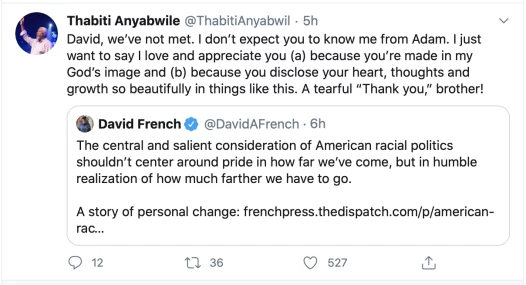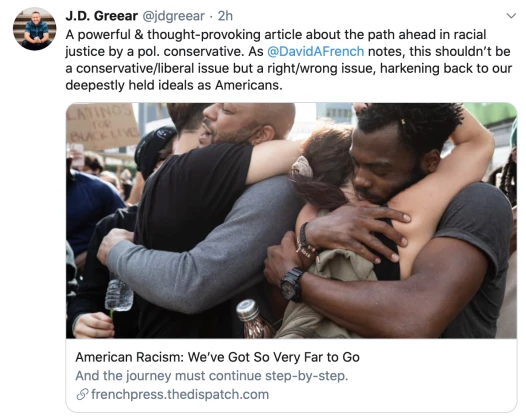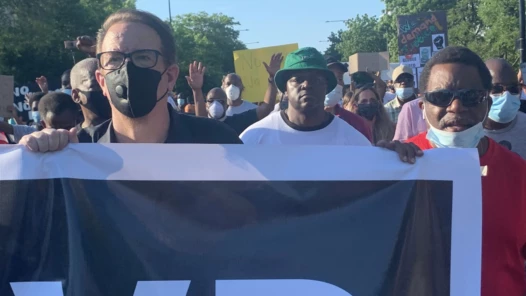A #BlackLivesMatter Edition of #MustReads curated content from around the interwebs.
One of the ways to make the most of this moment is to listen and learn. Below are three articles that I have found informative, clarifying, and convicting. I will highlight some learnings below each heading but really encourage you to read each article in full. Each one is written by a conservative evangelical Christian and is challenging their own community to embody the faith more deeply in one way or another.
Is Black Lives Matter the New Civil Rights Movement?
(an audio presentation version of Dr Mika Edmonson's piece is available through the link as well)
"Refusal to address racialized sin has undermined our capacity to fulfill our Romans 12:15 calling to “mourn with those who mourn.” The unique calling of the church (as opposed to the institutions of the world) is not simply to tolerate one another, or even simply to understand one another, but to mourn with one another and bear one another’s burdens... But in the church, white suburban men are called to cry tears with the black inner-city woman scared to death her husband is going to be the next Eric Garner, or that her teenage son is going to be the next Trayvon Martin or Tamir Rice. And if you are so entrenched in your socio-political camp that you can’t shed some tears with Tanisha, something is deeply wrong. Because that’s who the church is called to be. That’s the kind of thing that makes our unity in Christ really conspicuous and causes people to see that there is a unique power at work in the church unlike anything in this world."
I just want to clear up a common misconception about the Black Lives Matter sentiment. Black Lives Matter does not mean “black lives matter only.” It means “black lives matter too.” It’s a contextualized statement, like saying “children’s lives matter.” That doesn’t mean adult lives don’t matter... In the face of a historic and contemporary context that has uniquely disparaged black life as not worth valuing or protecting in the same way as others, they are saying black lives matter just as much as every other life. Ironically, saying “Black Lives Matter” is really a contextualized way of saying, “All Lives Matter.”
"My wife has to beg me (a grown 37-year-old man) not to go out to Walmart at night, not because she’s afraid of the criminal element, but because she’s afraid of the police element. Because she knows that when the police see me, they aren’t going to see Mika Edmondson, pastor of New City Fellowship Presbyterian church. When they see me, they aren’t going to see Mika Edmondson, PhD in systematic theology. When they see me, all they’re going to see is a black man out late at night. And she knows we’re getting stopped at 10-times the rate of everybody else, arrested at 26-times the rate of everybody else, and killed at 5-times the rate of everybody else. Black Lives Matter can see the injustice in those statistics. How can Black Lives Matter see the value of black life better than we can? Why does Black Lives Matter care more about the value of my life than you do?"
"There’s a reason many of us have not addressed these issues. We know well the cultural risks involved and the pushback we’ll get in our churches and institutions. It’s risky to address racial sin."
"We have a natural tendency to actively resist dealing with racial sin... How else could Jonathan Edwards and George Whitefield have had such great theology but think that it had nothing to say to the black suffering they saw all around them? (Edwards wrote copious notes on the duty of Christian charity to the poor on the one hand, while callously purchasing trembling little African girls off the auction block on the other.).... Evangelicals have a social ethic, but it’s a strangely selective social ethic. We show our feelings about the Lord by how we treat our neighbors made in his image."

American Racism: We've Got So Very Far To Go
"I always deplored racism—those values were instilled in me from birth—but I was also someone who recoiled at words like “systemic racism.” I looked at the strides we’d made since slavery and Jim Crow and said, “Look how far we’ve come.” I was less apt to say, “and look how much farther we have to go.” "

"Here’s one definition—“structural” or “systemic” racism is: A system in which public policies, institutional practices, cultural representations, and other norms work in various, often reinforcing ways to perpetuate racial group inequity. It identifies dimensions of our history and culture that have allowed privileges associated with “whiteness” and disadvantages associated with “color” to endure and adapt over time. Structural racism is not something that a few people or institutions choose to practice. Instead it has been a feature of the social, economic and political systems in which we all exist."
If politically correct progressives are often guilty of over-racializing American public discourse, and they are, politically correct conservatives commit the opposite sin—and they filter out or angrily reject all the information that contradicts their thesis.

"I believe the following things to be true:
1. Slavery was legal and defended morally and (ultimately) militarily from 1619 to 1865.
2. After slavery, racial discrimination was lawful and defended morally (and often violently) from 1865 to 1964.
3. The Civil Rights Act of 1964 did not end illegal discrimination or racism, it mainly gave black Americans the legal tools to fight back against legal injustices.
4. It is unreasonable to believe that social structures and cultural attitudes that were constructed over a period of 345 years will disappear in 56.
5. Moreover, the consequences of 345 years of legal and cultural discrimination, are going to be dire, deep-seated, complex, and extraordinarily difficult to comprehensively ameliorate."
It’s hard even to begin to describe all the ramifications of 345 years of legalized oppression and 56 years of contentious change, but we can say two things at once—yes, we have made great strides (and we should acknowledge that fact and remember the men and women who made it possible), but the central and salient consideration of American racial politics shouldn’t center around pride in how far we’ve come, but in humble realization of how much farther we have to go.
"Taking the next steps down that road will have to mean shedding our partisan baggage. It means acknowledging and understanding that the person who is wrong on abortion and health care may be right about police brutality. It means being less outraged at a knee on football turf than at a knee on a man’s neck. And it means declaring that even though we may not agree on everything about race and American life, we can agree on some things, and we can unite where we agree."
Pro ALL Life: Why I Protest And Encourage You To Do So Too
"I'm convinced that Christians need to speak out and to protest at times. And the reality is, all Christians believe this about certain issues. For example, it does not seem controversial when we march for life. But it does seem controversial when we march for racial justice, and I think it’s worth exploring why."
"As Protestants, protest is a part of our faith heritage. That’s part of why we are called Protestants."
As Evangelicals, we are people defined in part by our heritage of revival, reform, and renewal. We are at our best when we are calling ourselves, our churches, and our communities to resist both dead orthodoxy and empty moralism. At our core, we are supposed to be people who work to protest spiritual lethargy.
"Some conservatives (often evangelicals) seem intent upon focusing on other issues so as to bypass the heart of the matter and the point of the peaceful protests... Even as evidence of violence and prejudice mounts and the pleas from their brothers and sisters of color intensify, their social media feeds instead focus on the riots and looting. Tying the protests and riots together, some are trying to dismiss the former by way of the latter. Here’s the challenge: You can simultaneously speak out against systemic racism and looting and violence. Evangelicals sometimes struggle with the former but demand the latter. Followers of Jesus must do both."

"I’m aware of concerns surrounding the BLM movement but that doesn’t negate the significance of the phrase. Actually, those who respond with “All Lives Matter” are missing the point. All lives don’t matter if black lives don’t matter. Instead of throwing back casual soundbites, we should be grieved we have reached a place where so many in the African American community believe their lives do not matter to us. Regardless of politics, it marks a tragic failure on our part to live out scripture’s imperative to be known for our love."
You already probably knew that the unborn need your voice. Well, so do your African American brothers and sisters who have been born into a world where they wonder if their lives really do matter.
Finally, I want to acknowledge my friend and fellow Central pastor, Chris Ross. I plan our sermon series texts and preachers months in advance. We had no idea of what would unfold these past number of days, nor how providential #Blessed are the Peacemakers would be. Chris navigated the text, our MB history, and our moment with care, wisdom, and powerful preaching. No easy feat. Thank you, Chris.


